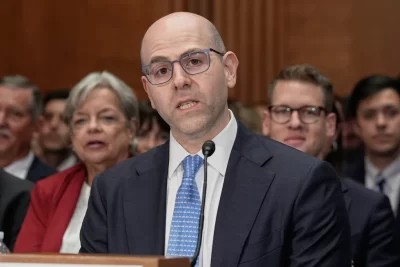
BANGKOK — Sweeping new tariffs announced Wednesday by U.S. President Donald Trump provoked dismay, threats of countermeasures and calls for further negotiations to make trade rules fairer.
But responses were measured, highlighting a lack of appetite among key trading partners for an outright trade war with the world’s biggest economy.
Trump said the import taxes, ranging from 10% to 49%, would do to U.S. trading partners what they have long done to the U.S. He maintains they will draw factories and jobs back to the United States.
“Taxpayers have been ripped off for more than 50 years,” he said. “But it is not going to happen anymore.”
Trump’s announcement of a new 20% tariff on the European Union drew a sharp rebuke from European Commission President Ursula von der Leyen, who said it was a “major blow to the world economy.”
“The consequences will be dire for millions of people around the globe,” von der Leyen said. Groceries, transport and medicines will cost more, she said while visiting Uzbekistan, “And this is hurting, in particular, the most vulnerable citizens.”
Von der Leyen acknowledged that the world trading system has “serious deficiencies” and said the EU was ready to negotiate with the U.S. but also was prepared to respond with countermeasures.
‘Nobody wants a trade war’
The British government said the United States remains the U.K.’s “closest ally,” and Business Secretary Jonathan Reynolds said the U.K. hoped to strike a trade deal to “mitigate the impact” of the 10% tariffs on British goods.
“Nobody wants a trade war and our intention remains to secure a deal,” said Reynolds. “But nothing is off the table and the government will do everything necessary to defend the U.K.’s national interest.”
Japan, America’s closest ally in Asia, plans to closely analyze the U.S. tariffs and their impact, Chief Cabinet Secretary Yoshimasa Hayashi said, while refraining from .talk of retaliation. But he said the moves would have a big impact on relations with the U.S. Italy’s conservative Premier Giorgia Meloni said the higher tariffs would benefit neither side.
“We will do everything we can to work towards an agreement with the United States, with the aim of avoiding a trade war that would inevitably weaken the West in favor of other global players,” Meloni said in a Facebook post.
Brazil, hit with a 10% tariff, said it was considering appealing to the World Trade Organization. Its congress unanimously passed a bill to allow retaliation for any tariffs on Brazilian goods.
‘Blow to the world economy’
Financial markets were jolted, with U.S. stock futures down by as much as 3% early Thursday and a 3.1% drop in Tokyo’s benchmark leading losses in Asia. Oil prices briefly sank more than $2 a barrel.
“The magnitude of the rollout — both in scale and speed — wasn’t just aggressive; it was a full-throttle macro disruption,” Stephen Innes of SPI Asset Management said in a commentary.
While the longer-term ramifications could encompass a dismantling of supply chains built up over decades, a more immediate concern is the higher risk of recession.
“The (average) U.S. tariff rate on all imports is now around 22%, from 2.5% in 2024. That rate was last seen around 1910,” Olu Sonola, Fitch Ratings’ head of U.S. Economic Research, said in a report.
“This is a game changer, not only for the U.S. economy but for the global economy. Many countries will likely end up in a recession. You can throw most forecasts out the door, if this tariff rate stays on for an extended period of time,” Sonola said.
The burden falls heaviest on Asia-Pacific nations, with the highest tariffs for impoverished, financially precarious countries like Laos at a 48% tariff, Cambodia at 49% and Myanmar at 44%.



